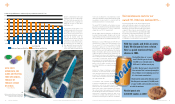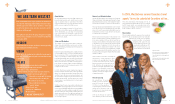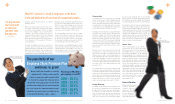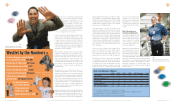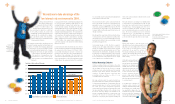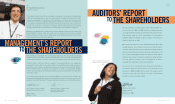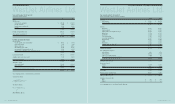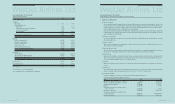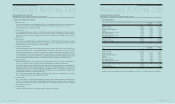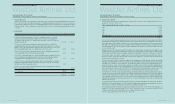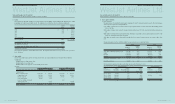Westjet 2003 Annual Report Download - page 15
Download and view the complete annual report
Please find page 15 of the 2003 Westjet annual report below. You can navigate through the pages in the report by either clicking on the pages listed below, or by using the keyword search tool below to find specific information within the annual report.
WestJet’s ESPP allows WestJetters to voluntarily
contribute up to 20% of their base salary towards the
purchase of common shares, which are matched dollar
for dollar by the company. This system has worked
extremely well at encouraging people to become WestJet
shareholders, thus aligning personal financial goals with
those of the company. Since 1999, an increasing percentage
of WestJetters have made the choice to participate. Not only
do our people think like business owners ... they are!
With commencement of service to Newfoundland in June 2003, WestJet's network spans Canada coast to coast for the first time.
28 | 2003 WestJet Annual Report
+
June 26, 2003: WestJet guests gain ability to earn AIR MILES®reward miles when booking on westjet.com. 2003 WestJet Annual Report |29
+
Compensation
Our growing business is sustained by the increasing
number of people we add to our team. Notwithstanding the
increase in our workforce, we have realized economies of
scale as our capacity increases and we achieve improvements
in operating efficiencies. Salary and benefit costs continue
to show declines in cost per ASM with an 8.9% reduction
in 2003 over 2002 from 2.4 cents to 2.2 cents.
The Employee Share Purchase Plan is a means for WestJetters
to take part in the Company’s success. WestJetters have
the option to contribute up to 20% of their salary towards
the purchase of WestJet shares, which are matched dollar for
dollar by the Company. Participation in the plan continues
to increase, with over 87% of our employees contributing
on average 13% of their salary towards the purchase of
WestJet shares. WestJet’s matching contribution expense
increased 35.3% from $10.2 million in 2002 to $13.8
million in 2003.
WestJet’s success is owed in large part to the hard work
and dedication of our team of exceptional people, and
when our airline is profitable, our employees share in this
financial success as part of our profit sharing plan. In
2003 approximately $15 million was paid to employees
in profit share, bringing the cumulative total profit share
incurred to over $60 million over the near-eight years of
our operations. Approximately 3,400 WestJetters received
an average of 13% of their salary through profit share
payments in 2003.
The Canadian Institute of Chartered Accountants recently
introduced new accounting standards for stock-based
compensation. Beginning January 1, 2004, all stock-based
compensation must be measured and recognized based on
the fair value of the instruments and expensed in the
financial statements. The Company intends to adopt the
changes retroactively on January 1, 2004, which will
result in retained earnings decreasing by $10.1 million.
Foreign Exchange
We realized a foreign exchange loss of $1.8 million in 2003
as a result of the strengthening of the Canadian dollar
throughout the year. We incur a portion of our expenditures
in US dollars (e.g. certain maintenance costs) and as a
result, we carry US-dollar cash and cash equivalents to
mitigate the effects of the foreign-exchange movement on
these costs. At year-end 2003, we had US $29.9 million
disruptions, and also from increased use of our Internet
distribution channel.
With less mechanical delays, we incur fewer costs to
accommodate our guests for inconveniences, and maintain
our excellent on-time performance (“OTP”), an important
measure of the reliability of an air carrier. A flight is
considered to be “on time” if it arrives at the gate of its
scheduled destination within 15 minutes of its scheduled
arrival time. In 2003, WestJet ranked second in OTP
among all reporting airlines in North America based on
the US Department of Transportation OTP data for
commercial airlines.
In addition to reliability, we provide our guests with a
convenient, hassle-free method to book their travel plans
through our investment in technology, such as our enhanced
platform for e-commerce growth. Continuous improvements
to our online service for both the public and travel agent
community led to an increase in Internet bookings year over year.
WestJet’s success is owed in large part to the hard
work and dedication of our team of exceptional people...
IT IS OUR CHOICES
THAT SHOW WHAT
WE TRULY ARE,
FAR MORE THAN
OUR ABILITIES.
~J.K. Rowling
in cash and cash equivalents. Also, we have US-dollar
liabilities related to our aircraft capital leases totalling US
$10.3 million at year-end, which slightly offset the impact of
the foreign-exchange-rate movement on our US-dollar cash.
We estimate for each $0.01 change in the Canadian dollar in
relation to the US dollar, the expense to WestJet increases or
decreases by approximately $2.6 million. For example, if the
Canadian dollar weakens from $0.74 to $0.73, our operating
expenses would increase by $2.6 million. Conversely, if the
Canadian dollar strengthens from $0.73 to $0.74, our
operating expenses would decrease by $2.6 million. The
impact of the foreign exchange rate movement on our US
dollar cash will have an offsetting effect to this
increase or decrease in operating expenses.
Income Taxes
Our 2003 overall effective tax rate of 37.8% is
an increase from 37.5% in 2002, and is higher
than the expected rate of 35.2% as reported in the
2002 MD&A. This was caused by the Ontario
government introducing Bill 2, An Act Respecting
Fiscal Responsibility 2003 on November 24, 2003.
The legislation repeals Ontario’s general tax reductions
that were scheduled for January 1, 2004, 2005 and
2006. Instead, effective January 1, 2004, Ontario’s
general corporate rate increased from 12.5% to
14.0%. This change required us to revalue the
entire future tax liability on our balance sheet in the
fourth quarter of 2003, which led to a fourth
quarter charge to our future income tax expense
of $2.3 million. Excluding this adjustment, the
2003 overall effective tax rate would have
been 35.5%. With our adoption of the new
stock option rules for 2004, we expect a
2004 overall effective tax rate of
approximately 38.5%.
Financial Condition
WestJet finished the year with
a generous cash balance
of $241.4 million, in
comparison to $100.4
million at December
31, 2002. Throughout
the year we maintained a
strong working capital ratio.
Cherri Laface, Trainer:
She enjoys Pilates, jogging,
salads and “chick flicks”.
Bookings at westjet.com grew from approximately 55% at
the end of 2002 to approximately 70% by the end of 2003.
With this increase in online bookings, we saw an expected
decline in bookings on some of our higher-cost channels.
Bookings in our call centre have decreased to 25% of total
sales volume in 2003 compared to 37% in 2002.
The Internet distribution channel is a lower-cost, higher-
margin method to distribute our product. In September, we
increased our web fare discount from $5 to $6 on round-
trip bookings to encourage our guests to book online.
Non-travel agent bookings have increased from 28.5% of
net online bookings in 2002 to 40.6% in 2003.
With the introduction of our AIR MILES program, we further
made the Internet an attractive alternative booking method.
Following introduction of this program in June 2003, our
online bookings on westjet.com increased approximately
seven-percentage points by year-end 2003.
Christine Jodoin, Team Leader, Montréal:
She likes music, wine, fine dining, and can
juggle with her hands and feet. The popularity of our
Employee Share Purchase Plan
continues to grow!
Percentage of WestJetters
participating in the ESPP:
1999 - 69.4%
2000 - 81.4%
2001 - 82.0%
2002 - 86.0%
2003 - 87.1%










